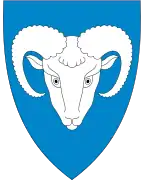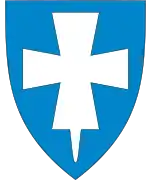Gjesdal Municipality
Gjesdal kommune | |
|---|---|
| Gjestal herred (historic name) Gjæsdal herred (historic name) | |
.jpg.webp) View of the Gjesdal landscape | |
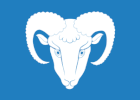 Flag | |
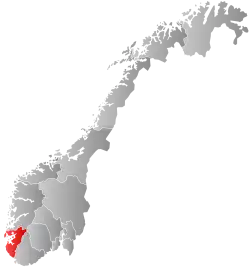 Rogaland within Norway | |
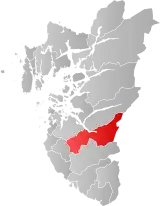 Gjesdal within Rogaland | |
| Coordinates: 58°46′55″N 06°00′31″E / 58.78194°N 6.00861°E | |
| Country | Norway |
| County | Rogaland |
| District | Jæren |
| Established | 1 Jan 1838 |
| • Created as | Formannskapsdistrikt |
| Administrative centre | Ålgård |
| Government | |
| • Mayor (2013) | Frode Fjeldsbø (Ap) |
| Area | |
| • Total | 617.99 km2 (238.61 sq mi) |
| • Land | 558.24 km2 (215.54 sq mi) |
| • Water | 59.75 km2 (23.07 sq mi) 9.7% |
| • Rank | #187 in Norway |
| Population (2022) | |
| • Total | 12,131 |
| • Rank | #95 in Norway |
| • Density | 21.7/km2 (56/sq mi) |
| • Change (10 years) | |
| Demonym | Gjesdalbu[1] |
| Official language | |
| • Norwegian form | Neutral |
| Time zone | UTC+01:00 (CET) |
| • Summer (DST) | UTC+02:00 (CEST) |
| ISO 3166 code | NO-1122[3] |
| Website | Official website |
Gjesdal is a municipality in Rogaland county, Norway. It is located in the traditional district of Jæren. The administrative centre of the municipality is the village of Ålgård. Other villages in Gjesdal include Dirdal, Frafjord, Gilja, Gjesdal, and Oltedal. The municipality lies about 25 kilometres (16 mi) to the southwest of the city of Stavanger in southwestern Norway.[4]
The European route E39 highway runs through the western side of the municipality. On the east side of the municipality, the Frafjord Tunnel connects the Frafjord valley with the rest of the municipality.
The 618-square-kilometre (239 sq mi) municipality is the 187th largest by area out of the 356 municipalities in Norway. Gjesdal is the 95th most populous municipality in Norway with a population of 12,131. The municipality's population density is 21.7 inhabitants per square kilometre (56/sq mi) and its population has increased by 12.6% over the previous 10-year period.[5][6]
General information



Name
The municipality (originally the parish) is named after the old Gjesdal farm (Old Norse: Gesdalir) since the first Gjesdal Church was built there. The first element is probably the old name of the local river, but the meaning is uncertain. The last element is the plural form of dalr which means "valley" or "dale".[7]
Before 1889, the name was spelled Gjæsdal, which is the Danish spelling. During the period from 1889 to 1917 it was spelled Gjesdal (Norwegian language version). On 3 November 1917, a royal resolution changed the spelling of the name of the municipality to Gjestal.[8] This was changed to mimic the pronunciation of the local dialect (the d in dal is pronounced t because of the voiceless consonant s in front). On 26 June 1964, a royal resolution changed the spelling of the name of the municipality back to Gjesdal as part of a border adjustment that was to take effect on 1 January 1965.[9] This change in spelling was made to bring the name back to the etymologically correct form of Gjesdal.[10]
Coat of arms
The coat of arms was granted on 15 March 1985. The official blazon is "Azure, a ram's head caboshed argent" (Norwegian: I blått et sølv værhode sett forfra). This means the arms have a blue field (background) and the charge is the head of a ram. The ram head has a tincture of argent which means it is commonly colored white, but if it is made out of metal, then silver is used. The ram was chosen as a symbol because sheep breeding and wool manufacturing have both been important throughout the history of Gjesdal. The wool industry was centered in the village of Ålgård where wool, textile, and clothing businesses have thrived. It is also an old heraldic charge, that may be found in a number of 14th century Norwegian seals. It depicts almost identical arms in a seal from 1400 of one Aslak Tordsson. The arms were designed by Kai Wood Moe after a preliminary draft by Jørgen Otteren. The municipal flag has the same design as the coat of arms.[11][12][13]
Churches
The Church of Norway has two parishes (sokn) within the municipality of Gjesdal. It is part of the Jæren prosti (deanery) in the Diocese of Stavanger.
| Parish (sokn) | Church name | Location of the church | Year built |
|---|---|---|---|
| Gjesdal | Dirdal Church | Dirdal | 1903 |
| Gjesdal Church | Gjesdal | 1848 | |
| Oltedal Church | Oltedal | 2002 | |
| Ålgård | Ålgård Church | Ålgård | 2015 |
| Old Ålgård Church | Ålgård | 1917 |
History
The parish of Gjæsdal was established as a municipality in 1838 (see formannskapsdistrikt law). It originally was much smaller than it is today, centered on the Gjesdalen valley in the western part of the present-day municipality. During the 1960s, there were many municipal mergers across Norway due to the work of the Schei Committee. On 1 January 1965 several areas were merged to form a much larger municipality of Gjesdal:[14]
- the original municipality of Gjesdal (population: 3,353)
- the Nedre Maudal area in Bjerkreim municipality (population: 40)
- the Oltesvik area along the Høgsfjorden in Høle municipality (population: 37)
- the parts of Forsand municipality south and east of the Frafjorden including Dirdal, Frafjord, Byrkjedal, Øvre Maudal, and Østabødal (population: 621)
On 1 January 1970, an unpopulated area of Time Municipality was transferred to Gjesdal. Then on 1 January 1989, another small, unpopulated area of Time was transferred to Gjesdal.[14]
Government
All municipalities in Norway are responsible for primary education (through 10th grade), outpatient health services, senior citizen services, welfare and other social services, zoning, economic development, and municipal roads and utilities. The municipality is governed by a municipal council of directly elected representatives. The mayor is indirectly elected by a vote of the municipal council.[15] The municipality is under the jurisdiction of the Sør-Rogaland District Court and the Gulating Court of Appeal.
Municipal council
The municipal council (Kommunestyre) of Gjesdal is made up of 27 representatives that are elected to four year terms. Currently, the party breakdown is as follows:
| Party name (in Norwegian) | Number of representatives | |
|---|---|---|
| Labour Party (Arbeiderpartiet) | 10 | |
| Progress Party (Fremskrittspartiet) | 4 | |
| Green Party (Miljøpartiet De Grønne) | 1 | |
| Conservative Party (Høyre) | 3 | |
| Christian Democratic Party (Kristelig Folkeparti) | 4 | |
| Centre Party (Senterpartiet) | 4 | |
| Socialist Left Party (Sosialistisk Venstreparti) | 1 | |
| Total number of members: | 27 | |
| Party name (in Norwegian) | Number of representatives | |
|---|---|---|
| Labour Party (Arbeiderpartiet) | 10 | |
| Progress Party (Fremskrittspartiet) | 4 | |
| Conservative Party (Høyre) | 4 | |
| Christian Democratic Party (Kristelig Folkeparti) | 6 | |
| Centre Party (Senterpartiet) | 3 | |
| Total number of members: | 27 | |
| Party name (in Norwegian) | Number of representatives | |
|---|---|---|
| Labour Party (Arbeiderpartiet) | 6 | |
| Progress Party (Fremskrittspartiet) | 5 | |
| Conservative Party (Høyre) | 6 | |
| Christian Democratic Party (Kristelig Folkeparti) | 7 | |
| Centre Party (Senterpartiet) | 2 | |
| Liberal Party (Venstre) | 1 | |
| Total number of members: | 27 | |
| Party name (in Norwegian) | Number of representatives | |
|---|---|---|
| Labour Party (Arbeiderpartiet) | 5 | |
| Progress Party (Fremskrittspartiet) | 6 | |
| Conservative Party (Høyre) | 3 | |
| Christian Democratic Party (Kristelig Folkeparti) | 6 | |
| Centre Party (Senterpartiet) | 3 | |
| Socialist Left Party (Sosialistisk Venstreparti) | 1 | |
| Liberal Party (Venstre) | 1 | |
| Total number of members: | 25 | |
| Party name (in Norwegian) | Number of representatives | |
|---|---|---|
| Labour Party (Arbeiderpartiet) | 5 | |
| Progress Party (Fremskrittspartiet) | 6 | |
| Conservative Party (Høyre) | 3 | |
| Christian Democratic Party (Kristelig Folkeparti) | 6 | |
| Centre Party (Senterpartiet) | 3 | |
| Socialist Left Party (Sosialistisk Venstreparti) | 2 | |
| Total number of members: | 25 | |
| Party name (in Norwegian) | Number of representatives | |
|---|---|---|
| Labour Party (Arbeiderpartiet) | 7 | |
| Progress Party (Fremskrittspartiet) | 4 | |
| Conservative Party (Høyre) | 5 | |
| Christian Democratic Party (Kristelig Folkeparti) | 6 | |
| Centre Party (Senterpartiet) | 2 | |
| Liberal Party (Venstre) | 1 | |
| Total number of members: | 25 | |
| Party name (in Norwegian) | Number of representatives | |
|---|---|---|
| Labour Party (Arbeiderpartiet) | 6 | |
| Progress Party (Fremskrittspartiet) | 2 | |
| Conservative Party (Høyre) | 4 | |
| Christian Democratic Party (Kristelig Folkeparti) | 6 | |
| Centre Party (Senterpartiet) | 5 | |
| Socialist Left Party (Sosialistisk Venstreparti) | 1 | |
| Liberal Party (Venstre) | 1 | |
| Total number of members: | 25 | |
| Party name (in Norwegian) | Number of representatives | |
|---|---|---|
| Labour Party (Arbeiderpartiet) | 6 | |
| Progress Party (Fremskrittspartiet) | 1 | |
| Conservative Party (Høyre) | 4 | |
| Christian Democratic Party (Kristelig Folkeparti) | 5 | |
| Centre Party (Senterpartiet) | 5 | |
| Socialist Left Party (Sosialistisk Venstreparti) | 3 | |
| Liberal Party (Venstre) | 1 | |
| Total number of members: | 25 | |
| Party name (in Norwegian) | Number of representatives | |
|---|---|---|
| Labour Party (Arbeiderpartiet) | 8 | |
| Progress Party (Fremskrittspartiet) | 3 | |
| Conservative Party (Høyre) | 4 | |
| Christian Democratic Party (Kristelig Folkeparti) | 5 | |
| Centre Party (Senterpartiet) | 3 | |
| Liberal Party (Venstre) | 2 | |
| Total number of members: | 25 | |
| Party name (in Norwegian) | Number of representatives | |
|---|---|---|
| Labour Party (Arbeiderpartiet) | 8 | |
| Progress Party (Fremskrittspartiet) | 1 | |
| Conservative Party (Høyre) | 6 | |
| Christian Democratic Party (Kristelig Folkeparti) | 5 | |
| Centre Party (Senterpartiet) | 4 | |
| Liberal Party (Venstre) | 1 | |
| Total number of members: | 25 | |
| Party name (in Norwegian) | Number of representatives | |
|---|---|---|
| Labour Party (Arbeiderpartiet) | 7 | |
| Conservative Party (Høyre) | 7 | |
| Christian Democratic Party (Kristelig Folkeparti) | 6 | |
| Centre Party (Senterpartiet) | 4 | |
| Liberal Party (Venstre) | 1 | |
| Total number of members: | 25 | |
| Party name (in Norwegian) | Number of representatives | |
|---|---|---|
| Labour Party (Arbeiderpartiet) | 7 | |
| Conservative Party (Høyre) | 4 | |
| Christian Democratic Party (Kristelig Folkeparti) | 6 | |
| Centre Party (Senterpartiet) | 6 | |
| Joint list of the Liberal Party (Venstre) and New People's Party (Nye Folkepartiet) |
2 | |
| Total number of members: | 25 | |
| Party name (in Norwegian) | Number of representatives | |
|---|---|---|
| Labour Party (Arbeiderpartiet) | 7 | |
| Conservative Party (Høyre) | 1 | |
| Christian Democratic Party (Kristelig Folkeparti) | 5 | |
| Liberal Party (Venstre) | 4 | |
| Local List(s) (Lokale lister) | 8 | |
| Total number of members: | 25 | |
| Party name (in Norwegian) | Number of representatives | |
|---|---|---|
| Labour Party (Arbeiderpartiet) | 8 | |
| Liberal Party (Venstre) | 4 | |
| Local List(s) (Lokale lister) | 13 | |
| Total number of members: | 25 | |
| Party name (in Norwegian) | Number of representatives | |
|---|---|---|
| Labour Party (Arbeiderpartiet) | 7 | |
| Local List(s) (Lokale lister) | 10 | |
| Total number of members: | 17 | |
| Party name (in Norwegian) | Number of representatives | |
|---|---|---|
| Labour Party (Arbeiderpartiet) | 7 | |
| Local List(s) (Lokale lister) | 10 | |
| Total number of members: | 17 | |
| Party name (in Norwegian) | Number of representatives | |
|---|---|---|
| Labour Party (Arbeiderpartiet) | 7 | |
| Local List(s) (Lokale lister) | 10 | |
| Total number of members: | 17 | |
| Party name (in Norwegian) | Number of representatives | |
|---|---|---|
| Labour Party (Arbeiderpartiet) | 6 | |
| Local List(s) (Lokale lister) | 10 | |
| Total number of members: | 16 | |
| Party name (in Norwegian) | Number of representatives | |
|---|---|---|
| Labour Party (Arbeiderpartiet) | 6 | |
| Local List(s) (Lokale lister) | 10 | |
| Total number of members: | 16 | |
| Party name (in Norwegian) | Number of representatives | |
|---|---|---|
| Labour Party (Arbeiderpartiet) | 6 | |
| Local List(s) (Lokale lister) | 10 | |
| Total number of members: | 16 | |
| Party name (in Norwegian) | Number of representatives | |
|---|---|---|
| Labour Party (Arbeiderpartiet) | 5 | |
| Joint List(s) of Non-Socialist Parties (Borgerlige Felleslister) | 4 | |
| Local List(s) (Lokale lister) | 7 | |
| Total number of members: | 16 | |
| Note: Due to the German occupation of Norway during World War II, no elections were held for new municipal councils until after the war ended in 1945. | ||
Mayors
The mayors (Norwegian: ordfører) of Gjesdal:[34]
- 1838-1839: Jesper Tjølsen Ravndal
- 1840-1841: Lars Svendesen Oftedahl
- 1842-1843: Christian Davidson Edland
- 1844-1847: Lars Eriksen Berge
- 1848-1852: Christian Davidson Edland
- 1852-1853: Peder Ingebretsen Kyllingstad
- 1854-1860: Aadne Larsen Søyland
- 1868-1877: Tore Larsen Bergen
- 1878-1879: Hans Svendsen Vasse
- 1880-1885: Jesper Jespersen Ravndal
- 1886-1887: Torger Johannesen Edland
- 1888-1889: David Olsen Lihme
- 1890-1893: Ole S. Aalgaard
- 1894-1898: Knud R. Kluge
- 1899-1901: Søren Arnesen
- 1902-1907: Knud R. Kluge
- 1908-1916: Sven Nilssen
- 1916-1919: Knud R. Kluge
- 1920-1931: Svein Søyland
- 1946-1961: K.B. Lima
- 1964-1967: Ingolf Stokkeland
- 1968-1971: Alf Kyllingstad
- 1972-1975: Alf Ravndal
- 1976-1983: Ingolf Stokkeland
- 1984-1987: Rasmus Flesjå (KrF)
- 1988-1991: Inger Sirevåg
- 1992-1999: Svein K. Søyland
- 2000-2007: Karl Edvard Aksnes (KrF)
- 2008-2013: Olaug Vervik Bollestad (KrF)
- 2013-present: Frode Fjeldsbø (Ap)
Geography
Gjesdal municipality is located in the southern part of the Jæren district in Rogaland county. To the north and northwest, Gjesdal borders the municipality of Sandnes, to the east is Sirdal municipality (in Agder county), to the south is Bjerkreim municipality, and to the west is the municipality of Time.
Gjesdal sits at the head of the Høgsfjorden and along the south and east sides of the Frafjorden. The Månafossen waterfall, the largest waterfall in Rogaland county, is located in the Frafjord valley. There are several large lakes in the municipality such as Edlandsvatnet, Flassavatnet, Limavatnet, and Oltedalsvatnet. The Figgjoelva river has its headwaters in Gjesdal also.
Weather
| Climate data for Gjesdal | |||||||||||||
|---|---|---|---|---|---|---|---|---|---|---|---|---|---|
| Month | Jan | Feb | Mar | Apr | May | Jun | Jul | Aug | Sep | Oct | Nov | Dec | Year |
| Daily mean °C (°F) | −0.1 (31.8) |
−0.2 (31.6) |
1.9 (35.4) |
4.8 (40.6) |
9.1 (48.4) |
12.1 (53.8) |
13.4 (56.1) |
13.6 (56.5) |
11.1 (52.0) |
8.1 (46.6) |
3.8 (38.8) |
1.4 (34.5) |
6.6 (43.9) |
| Average precipitation mm (inches) | 126 (5.0) |
90 (3.5) |
103 (4.1) |
65 (2.6) |
78 (3.1) |
85 (3.3) |
108 (4.3) |
140 (5.5) |
185 (7.3) |
195 (7.7) |
185 (7.3) |
155 (6.1) |
1,515 (59.6) |
| Average precipitation days (≥ 1 mm) | 15.5 | 12 | 14 | 11.2 | 12.5 | 12.2 | 13.1 | 15.3 | 18.1 | 18.5 | 19.1 | 17.7 | 179.2 |
| Source: Norwegian Meteorological Institute[35] | |||||||||||||
Notable people

- Liv Godin (1918 in Ålgård – 2012), a Norwegian missionary in the Democratic Republic of the Congo
- Finn E. Kydland (born 1943 in Søyland), an economist who was the winner of Nobel Memorial Prize in 2004
- Olaug Bollestad (born 1961), a Norwegian nurse and politician who was mayor of Gjesdal from 2007–2013
- Dagny Mellgren (born 1978 in Ålgård), a footballer who scored the gold medal goal for Norway at the 2000 Summer Olympics
- Leo Moracchioli (born 1978 in Ålgård), a multi-instrumentalist heavy metal musician and producer based in Oltedal
- Håvard Rugland (born 1984 in Ålgård), a Norwegian American football placekicker, known as "Kickalicious"
References
- ↑ "Navn på steder og personer: Innbyggjarnamn" (in Norwegian). Språkrådet.
- ↑ "Forskrift om målvedtak i kommunar og fylkeskommunar" (in Norwegian). Lovdata.no.
- ↑ Bolstad, Erik; Thorsnæs, Geir, eds. (26 January 2023). "Kommunenummer". Store norske leksikon (in Norwegian). Kunnskapsforlaget.
- ↑ Store norske leksikon. "Gjesdal" (in Norwegian). Retrieved 14 March 2016.
- ↑ Statistisk sentralbyrå. "Table: 06913: Population 1 January and population changes during the calendar year (M)" (in Norwegian).
- ↑ Statistisk sentralbyrå. "09280: Area of land and fresh water (km²) (M)" (in Norwegian).
- ↑ Rygh, Oluf (1915). Norske gaardnavne: Stavanger amt (in Norwegian) (10 ed.). Kristiania, Norge: W. C. Fabritius & sønners bogtrikkeri. pp. 155 and 159.
- ↑ "Norsk Lovtidende. 2den Afdeling. 1917. Samling af Love, Resolutioner m.m". Norsk Lovtidend (in Norwegian). Kristiania, Norge: Grøndahl og Søns Boktrykkeri: 1057–1065. 1917.
- ↑ "Norsk Lovtidende. 2den Afdeling. 1964. Samling af Love, Resolutioner m.m". Norsk Lovtidend (in Norwegian). Oslo, Norway: Grøndahl og Søns Boktrykkeri: 471. 1964.
- ↑ Store norske leksikon. "Gjestal" (in Norwegian). Retrieved 14 March 2016.
- ↑ "Civic heraldry of Norway - Norske Kommunevåpen". Heraldry of the World. Retrieved 2 July 2023.
- ↑ "Gjesdal, Rogaland (Norway)". Flags of the World. Retrieved 2 July 2023.
- ↑ "Godkjenning av våpen og flagg". Lovdata.no (in Norwegian). Norges kommunal- og arbeidsdepartementet. 25 May 1985. Retrieved 2 July 2023.
- 1 2 Jukvam, Dag (1999). Historisk oversikt over endringer i kommune- og fylkesinndelingen (PDF) (in Norwegian). Statistisk sentralbyrå. ISBN 9788253746845.
- ↑ Hansen, Tore; Vabo, Signy Irene, eds. (20 September 2022). "kommunestyre". Store norske leksikon (in Norwegian). Kunnskapsforlaget. Retrieved 14 October 2022.
- ↑ "Tall for Norge: Kommunestyrevalg 2019 - Rogaland". Valg Direktoratet. Retrieved 5 July 2020.
- 1 2 3 4 "Table: 04813: Members of the local councils, by party/electoral list at the Municipal Council election (M)" (in Norwegian). Statistics Norway.
- ↑ "Tall for Norge: Kommunestyrevalg 2011 - Rogaland". Valg Direktoratet. Retrieved 5 July 2020.
- ↑ "Kommunestyrevalget 1995" (PDF) (in Norwegian). Oslo-Kongsvinger: Statistisk sentralbyrå. 1996. Retrieved 5 July 2020.
- ↑ "Kommunestyrevalget 1991" (PDF) (in Norwegian). Oslo-Kongsvinger: Statistisk sentralbyrå. 1993. Retrieved 5 July 2020.
- ↑ "Kommunestyrevalget 1987" (PDF) (in Norwegian). Oslo-Kongsvinger: Statistisk sentralbyrå. 1988. Retrieved 5 July 2020.
- ↑ "Kommunestyrevalget 1983" (PDF) (in Norwegian). Oslo-Kongsvinger: Statistisk sentralbyrå. 1984. Retrieved 5 July 2020.
- ↑ "Kommunestyrevalget 1979" (PDF) (in Norwegian). Oslo: Statistisk sentralbyrå. 1979. Retrieved 5 July 2020.
- ↑ "Kommunevalgene 1975" (PDF) (in Norwegian). Oslo: Statistisk sentralbyrå. 1977. Retrieved 5 July 2020.
- ↑ "Kommunevalgene 1972" (PDF) (in Norwegian). Oslo: Statistisk sentralbyrå. 1973. Retrieved 5 July 2020.
- ↑ "Kommunevalgene 1967" (PDF) (in Norwegian). Oslo: Statistisk sentralbyrå. 1967. Retrieved 5 July 2020.
- ↑ "Kommunevalgene 1963" (PDF) (in Norwegian). Oslo: Statistisk sentralbyrå. 1964. Retrieved 5 July 2020.
- ↑ "Kommunevalgene og Ordførervalgene 1959" (PDF) (in Norwegian). Oslo: Statistisk sentralbyrå. 1960. Retrieved 5 July 2020.
- ↑ "Kommunevalgene og Ordførervalgene 1955" (PDF) (in Norwegian). Oslo: Statistisk sentralbyrå. 1957. Retrieved 5 July 2020.
- ↑ "Kommunevalgene og Ordførervalgene 1951" (PDF) (in Norwegian). Oslo: Statistisk sentralbyrå. 1952. Retrieved 5 July 2020.
- ↑ "Kommunevalgene og Ordførervalgene 1947" (PDF) (in Norwegian). Oslo: Statistisk sentralbyrå. 1948. Retrieved 5 July 2020.
- ↑ "Kommunevalgene og Ordførervalgene 1945" (PDF) (in Norwegian). Oslo: Statistisk sentralbyrå. 1947. Retrieved 5 July 2020.
- ↑ "Kommunevalgene og Ordførervalgene 1937" (PDF) (in Norwegian). Oslo: Statistisk sentralbyrå. 1938. Retrieved 5 July 2020.
- ↑ "Tidligere ordførere i Gjesdal". Gjesdal kommune (in Norwegian). 5 August 2021. Retrieved 2 July 2023.
- ↑ "eKlima Web Portal". Norwegian Meteorological Institute. Archived from the original on 14 June 2004.
External links
 Media related to Gjesdal at Wikimedia Commons
Media related to Gjesdal at Wikimedia Commons The dictionary definition of Gjesdal at Wiktionary
The dictionary definition of Gjesdal at Wiktionary Rogaland travel guide from Wikivoyage
Rogaland travel guide from Wikivoyage- Municipal fact sheet from Statistics Norway (in Norwegian)
